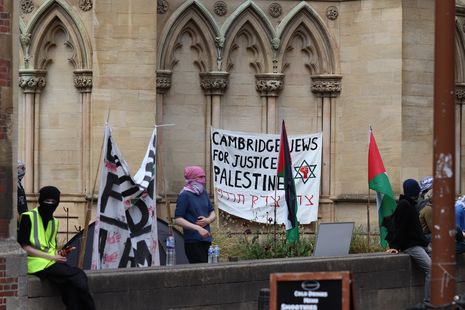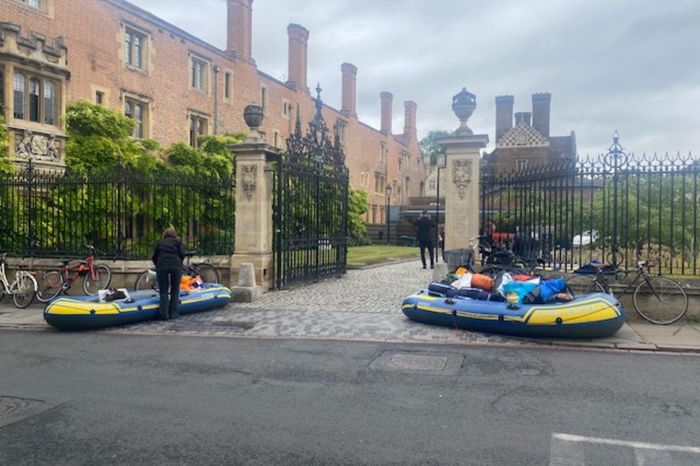Trinity and John’s see injunctions extended by 12 months
High Court Judge Andrew Twigger KC said protesters would be ‘more likely than not’ to re-establish encampments if the injunctions were not extended

Trinity College and St John’s College will have their injunctions against protesters extended by 12 months, following a High Court ruling yesterday (23/06).
This comes after both Colleges were granted temporary injunctions against protesters at the start of June, following pro-Palestine encampments on their land.
Under the extended injunctions, protests will be forbidden on both Colleges’ grounds until either 30 June 2026, or the end of the 2026 examination period.
Both Colleges were represented by Kester Lees KC of Falcon Chambers, who was instructed by law firm Bevan Brittan LLP.
Advocating for the extension of the injunctions, Lees suggested that the only reason for which there are no longer encampments Newton’s Lawn or the St John’s Lawn is because of the injunctions. He also emphasised the importance of protecting College students’ and staff members’ rights.
Grant Kynaston of the European Legal Support Center (ELSC) was permitted to intervene in the cases: a decision which High Court Judge Andrew Twigger KC explained was a result of the organisation’s “track-record of intervening in matters such as this”.
Kynaston argued that there were five reasons for which the injunctions sought by the Colleges were disproportionate. These were that the noise generated by the encampments was limited, that the Colleges could pursue less intrusive options than injunctions, that the Colleges did not attempt to use less intrusive options before obtaining interim injunctions, that the Colleges’ justifications for seeking injunctions were too vague, and that the absence of an injunction in the case of the 2024 King’s encampment demonstrated that court intervention is not necessary.
However, Twigger was satisfied that the encampments would likely return to Trinity and John’s if the injunctions were not extended.
Twigger stated that “the protesters perceive that causing disruption and annoyance will bring attention to their cause,” adding: “They are likely to consider that moving back to the Colleges’ land if the injunction is lifted will maximise the disruption and annoyance, not least because it will require the Colleges to make further applications.”
He added: “It is reasonable to infer from these considerations that, if an injunction is not granted, the protesters are more likely than not to move back to Newton’s Lawn, or the St. John’s Lawn (or both).”
Twigger said he was “satisfied” that there is an “imminent and real risk” that, without these injunctions, protesters would establish another encampment on the Colleges’ land. This, he said, “would cause real harm,” not only because of its “unlawful interference” with the land, but also because of the disruption it would cause to College staff and students, as well as visitors.
While ELSC Kynaston suggested that Twigger consider other solutions, such as the Colleges asking that the protesters avoid being too loud, Twigger decided that the protesters would be unlikely to comply with such a request.
The injunctions will prohibit protests by those who are found to be “deliberately creating a stationary or permanent obstruction on the Site”. They are directed at “persons unknown,” and to Cambridge History professor Hank Gonzalez, who was present at both encampments and voluntarily identified himself when court documents were served to protesters at the John’s encampment.
The ruling does, however, state that if there “is no longer an imminent and real trespass by C4P” at any point before June 2026, an application may be made to discharge the injunctions.
This ruling comes shortly after the publication of Office for Students guidance containing advice for higher education institutions regarding freedom of speech. The guidance contains advice about how to respond to hypothetical scenarios.
One of these hypothetical scenarios is a pro-Palestine encampment being established on a university lawn and a nearby building which are “ordinarily used for graduation ceremonies” at the time of a graduation ceremony.
The OfS recommends that, in such a situation, the occupiers be required to vacate the lawn for the period of the graduation ceremony, though clarifies that the university should not restrict protest on nearby spaces. The regulator advises against broader measures, using the hypothetical example of a 12-month ban on pro-Palestine protests on the lawn and university spaces within a 400 yard radius.
C4P, Trinity College, St John’s College, and the ELSC have been contacted for comment.
 News / Colleges charge different rents for the same Castle Street accommodation2 March 2026
News / Colleges charge different rents for the same Castle Street accommodation2 March 2026 News / News in Brief: waterworks, wine woes, and workplace wins 1 March 2026
News / News in Brief: waterworks, wine woes, and workplace wins 1 March 2026 News / Angela Merkel among Cambridge honorary degree nominees27 February 2026
News / Angela Merkel among Cambridge honorary degree nominees27 February 2026 News / Climate activists protest for ‘ethical careers policy’1 March 2026
News / Climate activists protest for ‘ethical careers policy’1 March 2026 News / King’s hosts open iftar for Ramadan3 March 2026
News / King’s hosts open iftar for Ramadan3 March 2026









